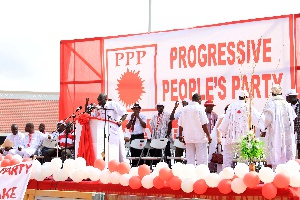The actions of institutions such as the Institute of Economic Affairs (IEA) throw the spotlight on the two main political parties to the detriment of smaller political parties in the country, Policy Analyst for the Progressive People’s Party (PPP) Kofi Asamoah Siaw has stated.
According to him, Ghana’s democracy “is facing a problem of [people] concentrating so much on the two big parties – [the National Democratic Congress (NDC) and the New Patriotic Party (NPP)] – and their behaviour and actions pose a threat to Ghana’s democracy as far as sustainability is concerned, because the smaller parties have been marginalised in a way that we have lost our position as a stabilising force between the parties”.
His comment comes in the wake of the IEA’s proposal for an unprecedented debate between the two leading candidates for the November presidential polls.
If the IEA succeeds, President John Mahama and NPP’s presidential candidate Nana Akufo-Addo will face each other in a one-on-one debate.
Speaking at a news conference in Accra Tuesday May 10, a senior research fellow at the IEA, Dr Michael Ofori Mensah, said the one-on-one debate was expected to provide a platform for Ghanaians to know the policy positions of the candidates and their parties.
The PPP’s 2012 Presidential Candidate, Dr Papa Kwesi Nduom, missed out on the debate in the last elections because the party did not have parliamentary representation at the time.
However, a separate debate will be held for parties without parliamentary representation and another for vice-presidential presidential candidates in the build-up to this year’s election.
“The IEA is exploring the possibility of holding a debate for the two frontrunners in the presidential elections and then we are at an advanced stage in discussions about holding a separate debate for candidates from parties without representation [in] parliament,” he stated.
“In terms of timelines, we envisage…the first presidential debate will be in the last week of September followed by the vice presidential debate in the first week of October. The second presidential debate, we envisage holding in the third week of October.”
But Mr Siaw has described the latest decision concerning the debate as “not satisfactory”.
He holds the view that: “They will wish that in a multiparty democratic setting, our attitude and our actions will seek to promote multiparty principles and not a duopoly, and the duopoly that we have focused on through IEA debates and so on, has come back to haunt us.”
He explained that political parties are not defined by the results they obtain in an election, but by Ghana’s constitution and the Political Parties’ Law.
“So, if you are an institution that is interested in promoting democracy, you go according to a certain benchmark and not your own guidelines that you have introduced. IEA’s attitude is something that we need to watch, and organising another debate for smaller parties because we have complained is not the way to go,” he underscored.
General News of Wednesday, 11 May 2016
Source: classfmonline.com

















